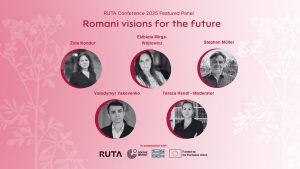The First Featured Panel “Romani Visions for the Future”

Romani Visions for the Future
The RUTA region(s) carry difficult legacies of violence against the Roma. From the histories of anti-Roma slavery, across contributions to the Nazi-German Holocaust against the Sinti and Roma, to the systemic practice of forced sterilization of Romani women that have outlasted regimes of state organised socialism, the current treatment of Ukrainian Romani refugees and the long ongoing forms of discrimination, many RUTA societies have much to account for. How can we address the past and present in ways that will support better futures? Which forms of material and epistemic reparations are key along this path? Which hopes can be grown amid abundance of pain and trauma? Are there specific methodologies that can help us foster meaningful and healing dialogues that will open new possibilities for social transformations? This panel will bring together a transregional group of leading Romani scholars, activists, experts and allies who will share their visions on the futures shaped by difficult pasts. Together, we will explore how we can navigate the way forward, towards bringing the better futures into being.
Speakers: Zola Kondur, Elżbieta Mirga-Wójtowicz, Stephan Müller and Volodymyr Yakovenko
Moderator: Tereza Hendl
Biographies
Zola Kondur has been a lifelong human rights advocate. She grew up in a traditional Roma family, but unlike many traditional families, her parents provided an education for all six children. In response to a serious inequality for Roma women, Zola helped to found and develop the International Charitable Organisation “Roma Women Fund Chiricli”, which established the Roma women’s movement in Ukraine and became one of the strongest Roma NGOs in Ukraine. From 2019, Ms Zola Kondur is a Tolerance Ambassador of UNDP Ukraine. Kondur’s human rights advocacy and passion for Roma issues has led to work with the government institutions and international human rights organisations, including her current role at the Council of Europe as a project manager for national minorities, Roma and anti-discrimination projects.
Elżbieta Mirga-Wójtowicz is a cultural animator, political scientist, and researcher. She works as an assistant professor at the Center for Migration Studies at the University of Warsaw, where she researches Roma forced migration (https://rocit.pl/). She has nearly 15 years of experience in government administration in the field of state policy towards ethnic and national minorities and in coordinating integration policy towards Roma in Poland. In 2008-2014, she was the plenipotentiary of the Małopolska Province Governor for national and ethnic minorities. Author of evaluation reports for the European Commission as part of the Roma Civil Monitor (2017-2020) and Roma Civil Monitor II (2021-2025) projects. Author of academic and popular science articles on Roma. Co-organizer of the international project commemorating the Roma Holocaust, “Dikh He Na Bister.” Member of the board of the Jaw Dikh Foundation. Member of the European Roma Institute for Arts and Culture (ERIAC).
Stephan Müller is a political scientist, working as an Advisor on International Affairs for the Central Council of German Sinti and Roma. He has more than 30 years experience working with vulnerable communities, in particular with Roma in Southeast and Central Europe. Since the start of the full-scale invasion of Russia he works closely with Roma civil society from Ukraine on raising awareness on the situation of Roma in and from Ukraine. Before joining the Central Council, he worked as an advisor on inclusion policies for vulnerable groups for several governments or government agencies and international organisations (European Union, OSCE, UN organisations, Council of Europe, World Bank) as well as non-governmental organisations (e.g., Open Society Foundation, CARE, Caritas). He is also a member of the board of the NGO Ukrainian Roma Advocacy Alliance “AURA” in Germany.
Volodymyr Yakovenko is a public figure of Roma origin, born in the Dnipropetrovsk region of Ukraine. He holds two higher education degrees in law and economics, which allow him to effectively combine legal expertise with an understanding of socio-economic processes. He served as the Coordinator of the Secretariat of the Interdepartmental Working Group on the implementation of the Roma Strategy 2020 under the Cabinet of Ministers of Ukraine, where he actively promoted Roma integration and human rights protection. He is also a co-founder of the Roma youth organization Youth Agency for the Advocacy of Roma Culture “ARCA” which focuses on youth development, cultural preservation, and the promotion of tolerance. Volodymyr is deeply committed to the values of equality, dignity, cultural diversity, and social justice. He believes in the power of education, dialogue, and solidarity as the foundation for building an inclusive society.
Tereza Hendl is a political philosopher, specialised in concerns of global health justice. She investigates concerns of oppression, vulnerability, refusal, empowerment, justice, and solidarity, and the ethics and epistemology of health technologies and interventions. Much of her research interrogates the impact of racialisation and white (western) supremacy, and the intersections of structural racism and sexism. Some of her latest work explores persistent hierarchies of knowledge as well as European East-West inequalities and their effects on health and wellbeing, also accounting for the impact of the intertwined and ongoing legacies of Russian and German imperialism, extractivism and coloniality. She is the founder of the CEE Feminist Research Network and co-founder of the RUTA Association for Central, South-Eastern, and Eastern European, Baltic, Caucasus, Central and Northern Asian Studies in Global Conversation. These initiatives amplify and interconnect so far epistemically marginalised knowledges and contribute to epistemic reparations.